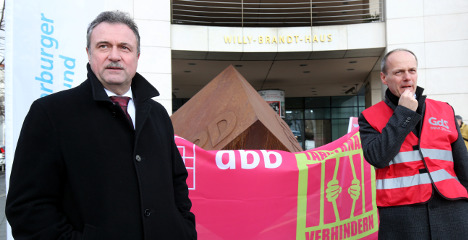Tuesday will see freight train drivers stop working at 3 pm in a walkout planned to last until 9 am on Friday.
Meanwhile, passenger services will be hit by the fresh round of strikes from 2 am on Wednesday until 9 pm on Thursday.
Train Drivers' Union (GDL) leader Claus Weselsky told the Passauer Neue Presse that drivers were striking for the first time since November because “the management apparently doesn't want to reach a result” in negotiations over pay, working hours and union representation.
The talks had failed to produce answers to the main questions in 16 rounds of meetings, he added, giving the example of setting limits on overtime.
SEE ALSO: What the train drivers' strike is all about
DB human resources head Ulrich Weber said that “the GDL could have had its hoped-for interim result on almost all points” before negotiations broke down last week.
The rail company's freight arm said the strike would seriously reduce its service, while the German Chambers of Commerce and Industry (DIHK) called them a “poison for Germany as a location for business”.
DIHK chief economist Alexander Schumann pointed out that around a million tonnes of goods are transported by train every day in Germany, meaning that production delays can be expected after just a few days of strikes.
But Weselsky rejected the idea that mediation could prevent the walkout.
“DB demands that we be ready to make compromises. But they aren't ready to do the same. In these conditions we won't go into a mediation,” he said.



 Please whitelist us to continue reading.
Please whitelist us to continue reading.
Member comments